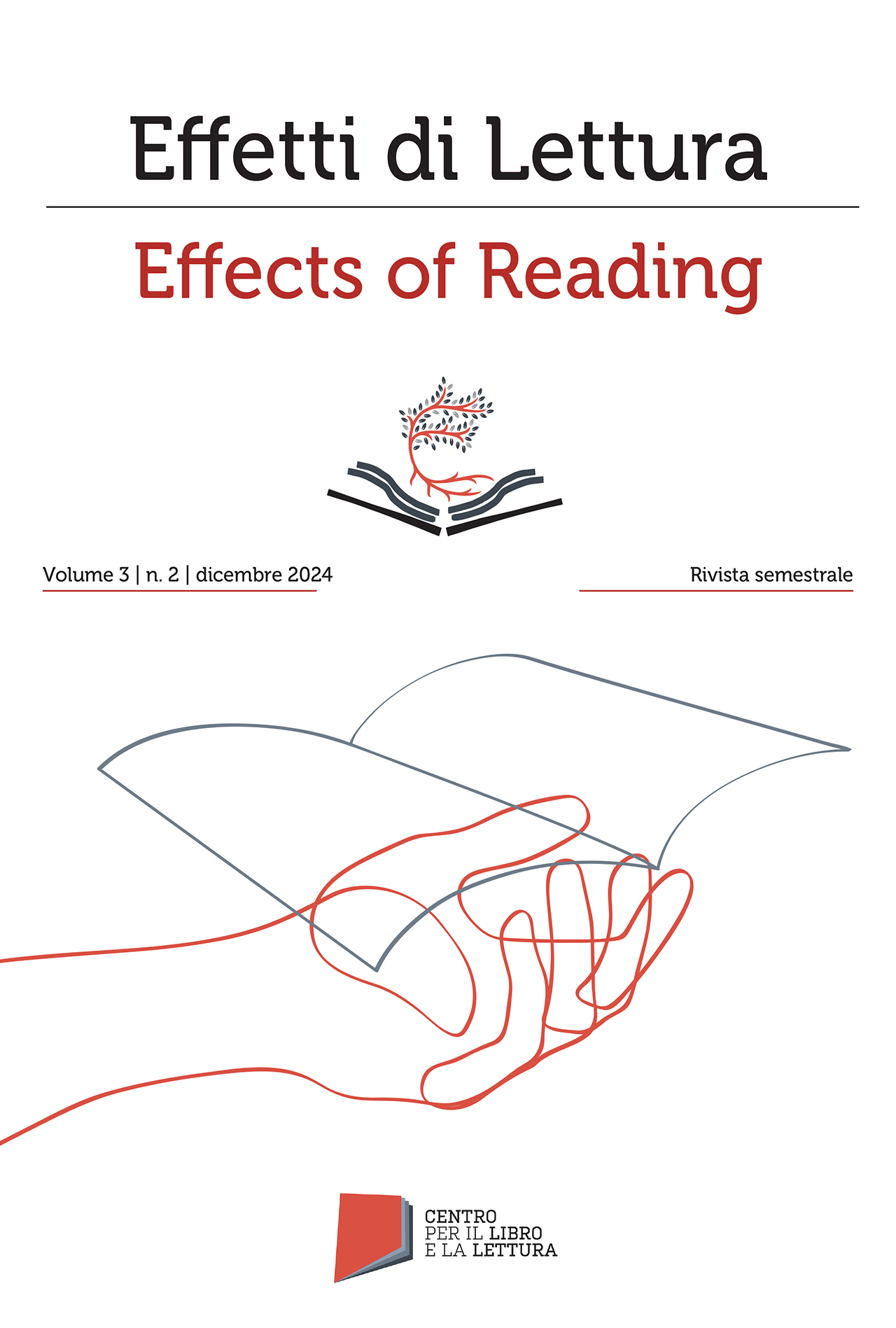Shared Reading Aloud: A Transformative Device for the Construction of Personal and Collective Identities.
DOI:
https://doi.org/10.7347/EdL-02-2024-03Keywords:
Lettura ad alta voce, Coesione sociale, Inclusione, Disuguaglianze socioeconomiche, EmpowermentAbstract
Shared read-aloud is a pedagogical method that fosters interaction with stories, demonstrating its relevance in addressing educational challenges such as school drop-out rates and socio-economic inequalities. Developed to empower individuals, this approach has proven effective in various contexts, from education to social services. Initial experiments focused on elderly populations suffering from dementia, but recent research has expanded its application to secondary education, promoting equity and academic success. This article explores the role of shared read-aloud as a transformative practice for social cohesion and identity-building. The results of the PRIN project "Aloud!" highlight the impact of reading in secondary schools, suggesting improvements in cognitive and linguistic skills, particularly among disadvantaged students. Integrating shared read-aloud into social policy supports its role in fostering inclusion and community resilience. Future research should investigate the application of this method in socio-assistance contexts, offering new methodologies for professionals in the field. The growing need for innovative educational strategies in Italy necessitates a shift towards practices that not only enhance educational outcomes but also promote social justice and equity.
Downloads
References
• Alvarez, P., García-Carrión, R., Puigvert, L., Pulido, C., & Schubert, T. (2018). Beyond the Walls: The Social Reintegration of Prisoners Through the Dialogic Reading of Classic Universal Literature in Prison. International Journal of Offender Therapy and Comparative Criminology, 62(4), 1043-1061. https://doi.org/10.1177/0306624X16672864
• Bartolucci, M., & Batini, F. (2019a). The effect of a narrative intervention program for people living with dementia. Psychology & Neuroscience, 12(2), 307–316. https://doi.org/10.1037/pne0000141
• Bartolucci, M., & Batini, F. (2019b). Long term narrative training can enhance cognitive performances in patients living with cognitive decline. Educational Gerontology, 45(7), 469–475
• Batini, F. (2011), Storie, futuro e controllo. Napoli: Liguori.
• Batini, F. (2018), Leggimi ancora. Lettura ad alta voce e Life Skills. Firenze: Giunti Scuola.
• Batini F. (2022), Lettura ad alta voce. Ricerche e strumenti per educatori, insegnanti e genitori. Roma: Carocci.
• Batini, F. (Ed) (2023). La lettura ad alta voce condivisa. Un metodo in direzione dell’equità. Bologna: il Mulino.
• Batini, F., & Corsini, C. (2024). Prevenire la dispersione scolastica con la lettura ad alta voce condivisa nelle scuole secondarie di primo grado. In Cadmo, 1/2024, p
• Batini, F., Barbisoni, G., & Marchetta, G. (2023). Shared reading aloud as a tool to improve integration: an experiment in Porta Palazzo (Turin, Italy). J-READING Journal of Research and Didactics in Geography, 1.
• Batini F., D’Autilia B., Barbisoni G., Toti G (2024), Reading Aloud and the Use of CAS-2 Battery to Assess Cognitive Skills Improvement, in: Education Research International, Volume 2024, Article ID 8868497, 10 pages, https://doi.org/10.1155/2024/886849
• Batini F. & Marchetta G. (2023, Eds.), La lettura ad alta voce condivisa. Atti del primo convegno scientifico internazionale. Lecce: Pensa Multimedia
• Batini F., Surian A., De Carlo M.E. (2023), Dispersione scolastica: definire il perimetro, ascoltare gli studenti e ispirarsi alle evidenze, in: Scialdone A., Aru S. (2023), Educare alla cittadinanza nei contesti interculturali, Roma, Carocci.
• Batini, F., & Toti, G. (2024). Shared reading aloud to enhance language and literacy. Education 3-13, 52(7), 946–962.
• Batini, F.; Toti, G.; Bartolucci, M. (2016), Neuropsychological benefits of a narrative cognitive training program for people living with dementia: A pilot study. DOI:2016;10:127-133. pp.127-133. In DEMENTIA & NEUROPSYCHOLOGIA - ISSN:1980-5764 vol. 10 (2)
• Billington, J. (2016). Is Literature Healthy? Oxford University Press.
• Billington, J. (Ed.). (2019). Reading and mental health. Springer Nature.
• Duncan, Samantha; Cullinan, Claire; Kelly, Esther; (2024) Reading the way: a social practice approach to reading development in prisons. Research and Practice in Adult Literacies (RaPAL) Journal, 109 (Summer) pp. 23-33.
• Elkialani, N. O. (2024). Read-Aloud in Arab American Families’ Homes: Knowledge Chain and Identity Maintenance (Doctoral dissertation, Washington State University).
• Lipari, V., & Salvato, R. (2024). Lettura ad Alta Voce e disabilità nel mondo degli adulti: un approccio prosociale. Effetti Di Lettura / Effects of Reading, 3(1), 040–052. https://doi.org/10.7347/EdL-01-2024-04
• Scierri, I.D.M, Bartolucci, M., & Salvato, R. (2018). Lettura e dispersione. Milano: FrancoAngeli.
Downloads
Published
How to Cite
Issue
Section
License
Copyright (c) 2025 Rosario Salvato

This work is licensed under a Creative Commons Attribution 4.0 International License.








